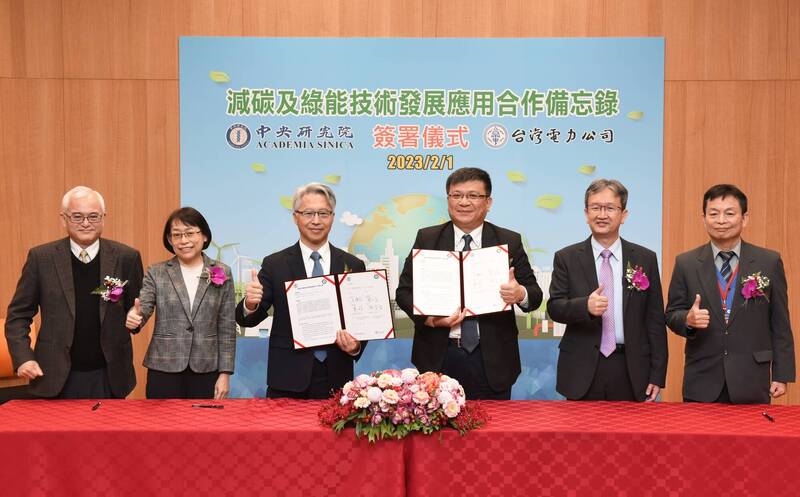The Academia Sinica and Taipower signed a Memorandum of Understanding (MOU) on carbon reduction and green energy technology development and application. Among them, the decarbonization and hydrogen combustion technology that can crack 40% of methane in natural gas with the least amount of energy will be trialed in Taipower's small-scale units this year.
(Provided by Academia Sinica)
[Reporter Yang Yuanting/Taipei Report] The decarbonization and hydrogen combustion technology developed by the Academia Sinica team has stably cracked 40% of methane into hydrogen and economically valuable "carbon black" with the least amount of energy. The academy announced today (1st) that it has cooperated with Taipower After signing the Memorandum of Understanding on Carbon Reduction and Green Energy Cooperation, this year, we will first apply the decarbonization and hydrogen combustion technology to small-scale power generation units for trial use, and evaluate the actual amount of carbon reduction that can be achieved after the trial implementation of practical power generation units. Test during maintenance, and it is expected to complete the docking test of the power plant unit within 2 years at the earliest.
Net-zero carbon reduction and green energy are the key to Taiwan’s energy transformation. Traditional natural gas power generation emits a lot of carbon dioxide. The “decarbonization and hydrogen combustion” technology can crack methane into hydrogen and carbon black, and burn hydrogen to generate electricity. No carbon emissions will be emitted during the process. In addition, this natural gas power generation will also become green electricity, which can generate about 4,300 kilowatt-hours of electricity per ton. Chen Yugao, director of the Environmental Change Research Center of the Academia Sinica, said that the decarbonization and hydrogen combustion technology developed by the Academia Sinica can stably crack 4 The methane produced is hydrogen and carbon black, an industrial raw material that can be used in tires, batteries and rubber products. That is to say, if it is put into commercial application, it will reduce 40% of the current carbon emissions.
Please read on...
After the Academia Sinica and Taipower signed the MOU, Chen Yugao said that the technology will be connected to the power plant and put into commercial transfer test. The current trial part will be tested on small-scale units first to observe the actual amount of carbon reduction if it is put into commercial transfer. In addition, because Taipower’s units are put into power generation every day, after the small-scale unit test is successful, it will take 1 to 2 days to test the technology during the maintenance of each unit. It is expected to complete the docking with Taipower’s power plant in about 2 years. Commercial transfer test.
All countries are competing in decarbonization and hydrogen technology. Chen Yugao said that Germany, the United States, and Taiwan have all reached the final stage of docking and commercial transfer. He also expressed that as a researcher in my country, he certainly hopes that Taiwan can take the lead in technology. And come out on top, and promote the technology to countries.
Chen Yugao said that if everything is put into commercial operation smoothly, Taiwan’s annual carbon emissions of about 300 million tons of power generation will be greatly reduced. In addition, this technology will produce carbon black with economic value, which will also meet the domestic demand for carbon black raw materials in the future. .
Dean of Academia Sinica Liao Junzhi said that in response to the national goal of net zero emissions in 2050, Academia Sinica issued the "Taiwan Net Zero Technology R&D Policy Proposal" in November last year, specifically suggesting that "creating sufficient zero-carbon electricity" be the core of my country's net zero technology promotion strategy The top priority, and said that the primary cooperation project with Taipower is the application of decarbonized hydrogen power generation. It is hoped that through the research and development end to connect the application end, the implementation of the technology will be accelerated, and the country will be able to increase the proportion of zero-carbon electricity as soon as possible; Taipower agent Chairman Zeng Wensheng said that Taipower's accumulated experience in integrating power plant systems over the years is the best support for the practical implementation of the decarbonization and hydrogen combustion technology. He hopes that through cooperation, the development time of this technology project can be greatly shortened.
